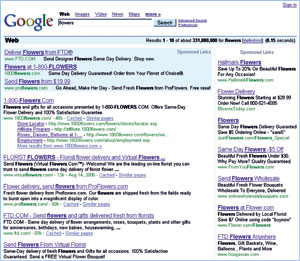Top of Mind from 3by400
The World of Google I
 There are few people in the country—possibly the world—who are not familiar with Google. Google has become synonymous with a new generation that is used to having all of the information of the Internet at their fingertips, since any topic can be found through the familiar Google search engine. As a project for Stanford graduates Larry Page and Sergey Brin, the world’s most thorough search engine now sets the rules for how web sites are indexed and promoted on the worldwide web. Google’s mission is to organize the world’s information and make it universally accessible and useful. The word “google” has even been made it into Webster’s Dictionary, officially defined as “to use the Google search engine to obtain information about (as a person) on the World Wide Web.”
There are few people in the country—possibly the world—who are not familiar with Google. Google has become synonymous with a new generation that is used to having all of the information of the Internet at their fingertips, since any topic can be found through the familiar Google search engine. As a project for Stanford graduates Larry Page and Sergey Brin, the world’s most thorough search engine now sets the rules for how web sites are indexed and promoted on the worldwide web. Google’s mission is to organize the world’s information and make it universally accessible and useful. The word “google” has even been made it into Webster’s Dictionary, officially defined as “to use the Google search engine to obtain information about (as a person) on the World Wide Web.”
“Googol” is the mathematical term for a 1 followed by 100 zeros. Google’s play on the term reflects the company’s mission to organize the immense amount of information available on the web.
The Google search engine is only the tip of the iceberg for products made by the company. Google is intent upon ruling the world—by providing some of the first real competition to Microsoft in the arena of office collaboration through Google Apps, and by allowing you to literally view the world a whole new way using Google Earth. Originally, I was going to review these two useful Google tools in this column, but while I was researching the corporate background, I received an e-mail from my cousin about the perfect job—and it was at Google. Since I don’t believe in coincidence, I deemed it more appropriate to first describe the company that makes these great tools first…you’ll have to wait for next month’s column to read about the tools.
The video clip that I saw first appeared on Oprah. To quote one of the employees, the short film described an environment that could only be topped by “not working at all.” Pets can accompany their masters at this workplace; the free cafeteria is stocked by an on-site chef; the pounds can melt away at the free, on-site full gym; exceptional insurance and benefits; and many of the employees who have been there for over five years are millionaires because of the generous stock options awarded in earlier days. Before you send your resume, however, know that they receive about 1,400 per day.
These types of employee perks indicate two things: the executive team is very focused on keeping happy employees; and profits are high—very high. Like many other more progressive companies, Google knows that these two items are closely related. One tends to beget the other. The real stance of the company is clearly seen in their “ten things Google has found to be true”:
• Focus on the user and all else will follow.
• It’s best to do one thing really, really well.• Fast is better than slow.
• Democracy on the web works.
• You don’t need to be at your desk to need an answer.
• You can make money without doing evil.
• There’s always more information out there.
• The need for information crosses all borders.
• You can be serious without a suit.
• Great just isn’t good enough.
These philosophies seem to be working quite well for both company and employees.
In addition to the ten truths, or possibly as a result of these truths, Google has managed to develop search technologies that are currently unmatched in terms of quantity and quality.
Google has commanded the search industry, and with it a tremendous amount of advertising revenues, by providing results that users can trust. To present data most relevant to the user’s search, Google uses PageRank and Hypertext-Matching Analysis.
— PageRank Technology: PageRank reflects Google’s view of the importance of web pages by considering more than 500 million variables and 2 billion terms. Pages that Google believes are important pages receive a higher PageRank and are more likely to appear at the top of the search results.
PageRank also considers the importance of each page that casts a vote, as votes from some pages are considered to have greater value, thus giving the linked page greater value. Important pages receive a higher PageRank and appear at the top of the search results. Google’s technology uses the collective intelligence of the web to determine a page’s importance. There is no human involvement or manipulation of results.
— Hypertext-Matching Analysis: Google’s search engine also analyzes page content. However, instead of simply scanning for page-based text (which can be manipulated by site publishers through meta-tags), Google’s technology analyzes the full content of a page and factors in fonts, subdivisions, and the precise location of each word. Google also analyzes the content of neighboring web pages to ensure the results returned are the most relevant to a user’s query.
 So, the search engine provides great results, but how, exactly, does Google make money…and so much of it? Like all fabulous web site ideas, the real money is in the advertising. Since Google has become so popular, they have also become the web-based advertising venue of choice. There are two types of Google advertising: AdWords and AdSense.
So, the search engine provides great results, but how, exactly, does Google make money…and so much of it? Like all fabulous web site ideas, the real money is in the advertising. Since Google has become so popular, they have also become the web-based advertising venue of choice. There are two types of Google advertising: AdWords and AdSense.
AdWords are what most people know as “click through.” This means that the advertiser chooses which search words they wish to sponsor. When a user includes those search words in a Google search, the advertiser site link appears at the top and to the right of search results. These links are clearly labeled as “sponsored links” so the user knows it is a paid spot. The links displayed are also pertinent to the user’s search, which Google believes is what allows the advertisement to be a legitimate part of the search result. The advertiser is charged only when a user clicks the link to go to their site. A budget can be set electronically so the advertiser doesn’t receive any surprises at the end of the month.
AdSense is rather like a portable version of AdWords. AdSense is subscribed to by web site owners. The AdSense applet is loaded onto web pages and, based upon the content of the page, relevant AdWord advertisers are displayed as linked text within a small customizable box on the page. AdSense tools allow the webmaster to filter inappropriate ads and competitor’s ads. Google provides all ads and when an ad is clicked from your site, you get paid by Google. Significant revenues would only be provided by a significant number of clicks to an advertiser’s page from the AdSense spot on your page. However, even if all AdSense does is pay for your participation in AdWords, it would be beneficial.
Another way Google generates revenue is by professional implementations of their best tools: Mini, Google Earth, Google Maps, SketchUp Pro, Google Apps, and several other collaboration utilities. These tools are not always just for large companies—they can fit into even the smallest business for very reasonable cost. For the full list and potential costs, see www.google.com/enterprise.
Although there are other search engines in existence—and some very good ones—Google stands by their philosophy of continuous improvement. As they add more applications and utilities to their bag of tricks, one might wonder if they have forgotten that “it’s best to do one thing really, really well.” For now, I’m willing to get behind a company that can really live “You can make money without doing evil.”
Next month, we’ll review how you can use Google applications like Google Maps and Google Apps to help your business on the web.
Google is a registered trademark. Some information provided from www.google.com.
This article used with permission from 400 Edition, Inc. It is unlawful to use this article or any portion of it without the expressed permission of its author. This email address is being protected from spambots. You need JavaScript enabled to view it.
